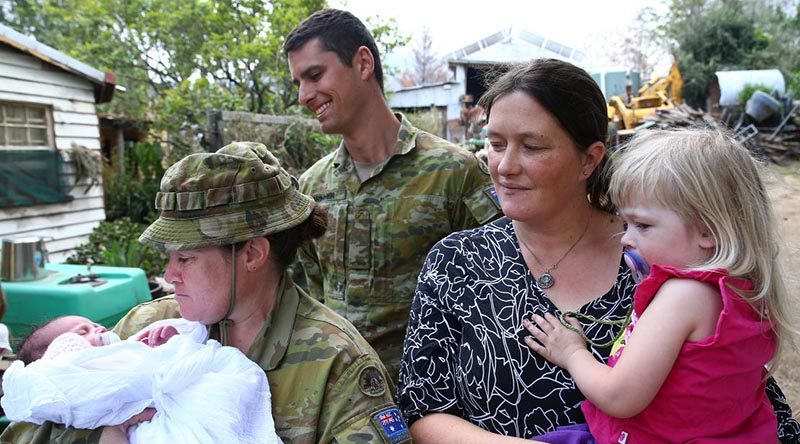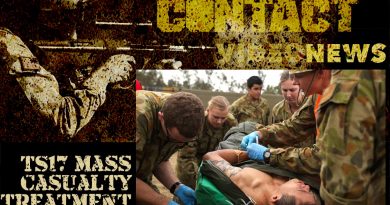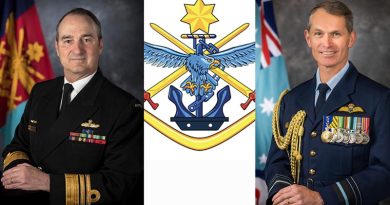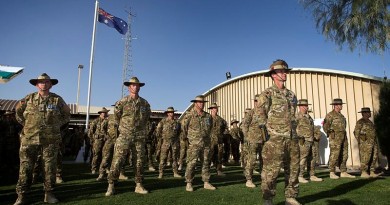Soldiers deliver baby – nearly

A woman runs into the Cobargo relief centre on 21 January, grabbing towels and saying her daughter was in labour – and the Army springs to action.
CAPTION: Corporal Kristie Connell, of the 8th Combat Service Support Battalion, and Private Nicholas Brimmer, of the 2nd/17th Battalion, Royal New South Wales Regiment, with Sarah and Ruby Tyrrell and baby Ivy. Photo and story by Sergeant Max Bree.
RELATED STORIES: Operation Bushfire Assist 19-20
Lance Corporal Archie Fallon called an ambulance, but he knew it wouldn’t be able to reach the mum-to-be at Upper Brogo on the NSW south coast in time.
“I got on our radio to call up Army medics, knowing the ambos coming from Bega would take a lot longer to get there than we could,” he said.
Nearby medic Corporal Kristie Connell was called off a task to respond to the situation.
“I was told to grab my kit, jump a fence and wait by the highway for pick-up because there’s a lady in labour,” she said.
Despite more than eight years as an intensive care nurse, Corporal Connell had only limited experience with births.
She was joined by Private Nicholas Brimmer, who had helped deliver five babies – but only over the phone as an ambulance dispatcher.
They formed part of a team that took a winding dirt road through fire-ravaged hills to the home of soon-to-be-mum-of-six Sarah Tyrrell.
Fire had burned around Sarah’s house for three days from New Year’s Eve, but the home was spared thanks to lucky winds and the efforts of her husband Byron, who defended the property with a water pump.
“We found Sarah sitting on a beach chair, probably not the best position, but she was calm and we got her on the couch,” Private Brimmer said.
“It was good knowing she wasn’t crowning, but being the sixth child, it could come very quickly.”
Private Brimmer tried to remember the emergency-birth checklist normally on his desk.
“You get the pregnant woman on her back or in a position that’s most comfortable,” he said.
“If she gets the urge to push, just push, don’t try and fight because that can hurt the baby.
“You also think about alternative positions in case there are any breech problems or the umbilical cord is showing.”
Sarah was on a couch with towels tucked around her, contractions were timed and an off-site medical officer prepared for a video call if the baby came suddenly.
The medical officer also advised Corporal Connell in the event of imminent labour.
Sarah said she woke that day “with a couple of little niggling pains” but she did not think it was the onset of the birth.
“All of a sudden it hit, but the contractions were fairly distant.
“Then they were two minutes apart.
“I was getting nervous that it was going to be a home birth.”
By now, police had arrived but there was no sign of an ambulance.
Because of patchy phone reception, troop signaller Private Murray Richey set up satellite comms equipment [made possible by the US Army Space and Missile Defense Command].
“It was good a distraction for dad and the cops,” Private Richey said.
“They were more fascinated with the signals stuff than getting in the way of the labour.”
After about 30 minutes, an ambulance appeared.
On the way to hospital, Private Brimmer rode in the front passenger seat, while Corporal Connell assisted the paramedic in the rear of the ambulance.
“Sarah felt pressure on her pelvis, and because of previous quick deliveries, it was lights and sirens on,” Corporal Connell said.
Midwives took Sarah from the ambulance when they arrived at Bega hospital and, about five minutes later, baby Ivy was born.
“I’ll definitely enjoy telling this story,” Sarah said.
“It’s not every day you have the Army turn up to make sure your arrival is safe.
“They made sure everything ran smoothly.
“I couldn’t have asked for better help.”
.
.
.
.
.
.

.
.





